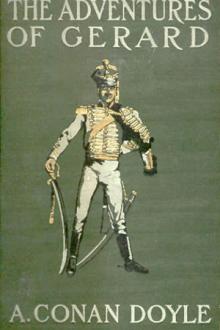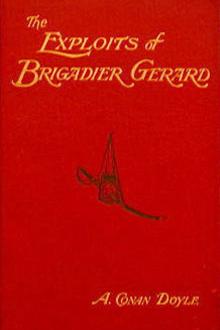A Visit to Three Fronts, June 1916 - Arthur Conan Doyle (best novels in english .TXT) 📗

- Author: Arthur Conan Doyle
- Performer: -
Book online «A Visit to Three Fronts, June 1916 - Arthur Conan Doyle (best novels in english .TXT) 📗». Author Arthur Conan Doyle
of war.
*
But this is digression. I had set out to say something of a day’s
experience of the French front, though I shall write with a fuller pen
when I return from the Argonne. It was for Soissons that we made,
passing on the way a part of the scene of our own early operations,
including the battlefield of Villers Cotteret—just such a wood as I
had imagined. My companion’s nephew was one of those Guards’ officers
whose bodies rest now in the village cemetery, with a little British
Jack still flying above them. They lie together, and their grave is
tended with pious care. Among the trees beside the road were other
graves of soldiers, buried where they had fallen. ‘So look around—and
choose your ground—and take your rest.’
Soissons is a considerable wreck, though it is very far from being an
Ypres. But the cathedral would, and will, make many a patriotic
Frenchman weep. These savages cannot keep their hands off a beautiful
church. Here, absolutely unchanged through the ages, was the spot where
St. Louis had dedicated himself to the Crusade. Every stone of it was
holy. And now the lovely old stained glass strews the floor, and the
roof lies in a huge heap across the central aisle. A dog was climbing
over it as we entered. No wonder the French fight well. Such sights
would drive the mildest man to desperation. The abb�, a good priest,
with a large humorous face, took us over his shattered domain. He was
full of reminiscences of the German occupation of the place. One of his
personal anecdotes was indeed marvellous. It was that a lady in the
local ambulance had vowed to kiss the first French soldier who
re-entered the town. She did so, and it proved to be her husband. The
abb� is a good, kind, truthful man—but he has a humorous face.
A walk down a ruined street brings one to the opening of the trenches.
There are marks upon the walls of the German occupation.
‘Berlin—Paris,’ with an arrow of direction, adorns one corner. At
another the 76th Regiment have commemorated the fact that they were
there in 1870 and again in 1914. If the Soissons folk are wise they
will keep these inscriptions as a reminder to the rising generation. I
can imagine, however, that their inclination will be to whitewash,
fumigate, and forget.
A sudden turn among some broken walls takes one into the communication
trench. Our guide is a Commandant of the Staff, a tall, thin man with
hard, grey eyes and a severe face. It is the more severe towards us as
I gather that he has been deluded into the belief that about one out of
six of our soldiers goes to the trenches. For the moment he is not
friends with the English. As we go along, however, we gradually get
upon better terms, we discover a twinkle in the hard, grey eyes, and
the day ends with an exchange of walking-sticks and a renewal of the
Entente. May my cane grow into a marshal’s baton.
*
A charming young artillery subaltern is our guide in that maze of
trenches, and we walk and walk and walk, with a brisk exchange of
compliments between the ‘75’s’ of the French and the ‘77’s’ of the
Germans going on high over our heads. The trenches are boarded at the
sides, and have a more permanent look than those of Flanders. Presently
we meet a fine, brown-faced, upstanding boy, as keen as a razor, who
commands this particular section. A little further on a helmeted
captain of infantry, who is an expert sniper, joins our little party.
Now we are at the very front trench. I had expected to see primeval
men, bearded and shaggy. But the ‘Poilus’ have disappeared. The men
around me were clean and dapper to a remarkable degree. I gathered,
however, that they had their internal difficulties. On one board I read
an old inscription, ‘He is a Boche, but he is the inseparable companion
of a French soldier.’ Above was a rude drawing of a louse.
I am led to a cunning loop-hole, and have a glimpse through it of a
little framed picture of French countryside. There are fields, a road,
a sloping hill beyond with trees. Quite close, about thirty or forty
yards away, was a low, red-tiled house. ‘They are there,’ said our
guide. ‘That is their outpost. We can hear them cough.’ Only the guns
were coughing that morning, so we heard nothing, but it was certainly
wonderful to be so near to the enemy and yet in such peace. I suppose
wondering visitors from Berlin are brought up also to hear the French
cough. Modern warfare has certainly some extraordinary sides.
Now we are shown all the devices which a year of experience has
suggested to the quick brains of our Allies. It is ground upon which
one cannot talk with freedom. Every form of bomb, catapult, and trench
mortar was ready to hand. Every method of cross-fire had been thought
out to an exact degree. There was something, however, about their
disposition of a machine gun which disturbed the Commandant. He called
for the officer of the gun. His thin lips got thinner and his grey eyes
more austere as we waited. Presently there emerged an extraordinarily
handsome youth, dark as a Spaniard, from some rabbit hole. He faced the
Commandant bravely, and answered back with respect but firmness.
‘Pourquoi?’ asked the Commandant, and yet again ‘Pourquoi?’ Adonis had
an answer for everything. Both sides appealed to the big Captain of
Snipers, who was clearly embarrassed. He stood on one leg and scratched
his chin. Finally the Commandant turned away angrily in the midst of
one of Adonis’ voluble sentences. His face showed that the matter was
not ended. War is taken very seriously in the French army, and any sort
of professional mistake is very quickly punished. I have been told how
many officers of high rank have been broken by the French during the
war. The figure was a very high one. There is no more forgiveness for
the beaten General than there was in the days of the Republic when the
delegate of the National Convention, with a patent portable guillotine,
used to drop in at headquarters to support a more vigorous offensive.
*
As I write these lines there is a burst of bugles in the street, and I
go to my open window to see the 41st of the line march down into what
may develop into a considerable battle. How I wish they could march
down the Strand even as they are. How London would rise to them! Laden
like donkeys, with a pile upon their backs and very often both hands
full as well, they still get a swing into their march which it is good
to see. They march in column of platoons, and the procession is a long
one, for a French regiment is, of course, equal to three battalions.
The men are shortish, very thick, burned brown in the sun, with never a
smile among them—have I not said that they are going down to a grim
sector?—but with faces of granite. There was a time when we talked of
stiffening the French army. I am prepared to believe that our first
expeditionary force was capable of stiffening any conscript army, for I
do not think that a finer force ever went down to battle. But to talk
about stiffening these people now would be ludicrous. You might as well
stiffen the old Guard. There may be weak regiments somewhere, but I
have never seen them.
I think that an injustice has been done to the French army by the
insistence of artists and cinema operators upon the picturesque
Colonial corps. One gets an idea that Arabs and negroes are pulling
France out of the fire. It is absolutely false. Her own brave sons are
doing the work. The Colonial element is really a very small one—so
small that I have not seen a single unit during all my French
wanderings. The Colonials are good men, but like our splendid
Highlanders they catch the eye in a way which is sometimes a little
hard upon their neighbours. When there is hard work to be done it is
the good little French piou-piou who usually has to do it. There is no
better man in Europe. If we are as good—and I believe we are—it is
something to be proud of.
*
But I have wandered far from the trenches of Soissons. It had come on
to rain heavily, and we were forced to take refuge in the dugout of the
sniper. Eight of us sat in the deep gloom huddled closely together. The
Commandant was still harping upon that ill-placed machine gun. He could
not get over it. My imperfect ear for French could not follow all his
complaints, but some defence of the offender brought forth a ‘Jamais!
Jamais! Jamais!’ which was rapped out as if it came from the gun
itself. There were eight of us in an underground burrow, and some were
smoking. Better a deluge than such an atmosphere as that. But if there
is a thing upon earth which the French officer shies at it is rain and
mud. The reason is that he is extraordinarily natty in his person. His
charming blue uniform, his facings, his brown gaiters, boots and belts
are always just as smart as paint. He is the Dandy of the European war.
I noticed officers in the trenches with their trousers carefully
pressed. It is all to the good, I think. Wellington said that the
dandies made his best officers. It is difficult for the men to get
rattled or despondent when they see the debonair appearance of their
leaders.
Among the many neat little marks upon the French uniforms which
indicate with precision but without obtrusion the rank and arm of the
wearer, there was one which puzzled me. It was to be found on the left
sleeve of men of all ranks, from generals to privates, and it consisted
of small gold chevrons, one, two, or more. No rule seemed to regulate
them, for the general might have none, and I have heard of the private
who wore ten. Then I solved the mystery. They are the record of wounds
received. What an admirable idea! Surely we should hasten to introduce
it among our own soldiers. It costs little and it means much. If you
can allay the smart of a wound by the knowledge that it brings lasting
honour to the man among his fellows, then surely it should be done.
Medals, too, are more freely distributed and with more public parade
than in our service. I am convinced that the effect is good.
*
The rain has now stopped, and we climb from our burrow. Again we are
led down that endless line of communication trench, again we stumble
through the ruins, again we emerge into the street where our cars are
awaiting us. Above our heads the sharp artillery duel is going merrily
forward. The French are firing three or four to one, which has been my
experience at every point I have touched upon the Allied front. Thanks
to the extraordinary zeal of the French workers, especially of the
French women, and to the clever adaptation of machinery by their
engineers, their supplies are abundant. Even now they turn out more
shells a day than we do. That, however, excludes our supply for the
Fleet. But it is one of the miracles of





Comments (0)